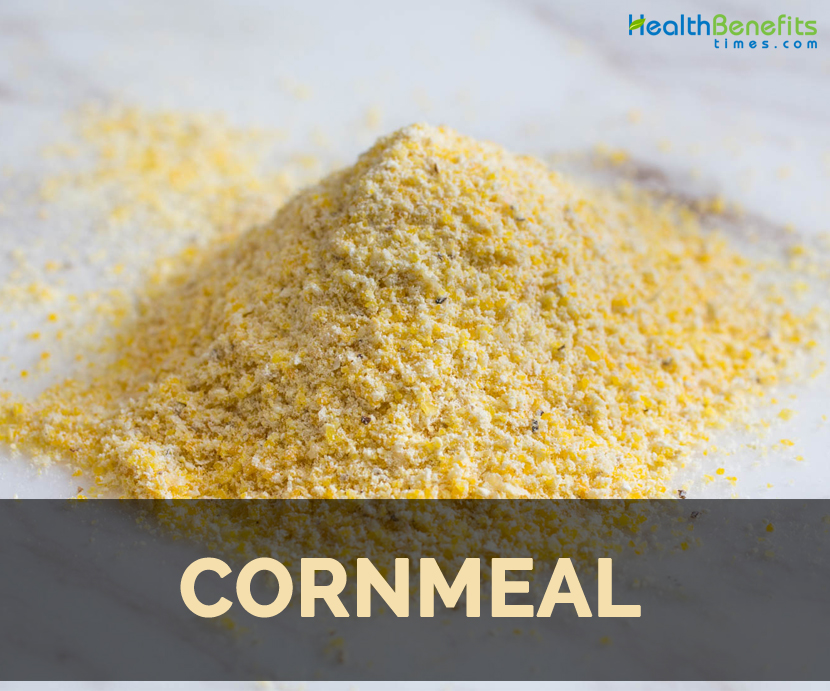| Cornmeal Quick Facts | |
|---|---|
| Name: | Cornmeal |
| Colors | Yellow or white |
| Taste | Sweet |
| Calories | 384 Kcal./cup |
| Major nutrients | Carbohydrate (56.08%) Vitamin B6 (45.38%) Iron (37.38%) Leucine (34.50%) Phosphorus (32.14%) |
Cornmeal is generally yellow or white which depends on the type of corn used. Whole grain cornmeal comprises oil, vitamins, fibrous hulls and starchy endosperm. It promotes rich and full taste and contains twice more nutrition than degerminated cornmeal. With high content of oil, whole grain cornmeal goes rancid quickly.
Types
Cornmeal is of various types:
- Blue cornmeal
Blue cornmeal is derived from whole blue corn and is light blue or violet in color. It possess sweet flavor. The dried kernels are dried and grounded into fine and medium texture.
- Steel-ground yellow cornmeal
This cornmeal is common in United States. The husk and germ of kernels is removed entirely. If stored well in a cool, dry place and airtight container, it could be preserved for about a year.
- Stone-ground cornmeal
Stone ground cornmeal encompasses germ and hull offering added flavor and nutrition. Though perishable, it could be stored for longer time period if refrigerated.
- White cornmeal
Familiar to Africa, white cornmeal is made from white corn. It is used for making cornbread in Southern United States.
Culinary uses
- Cornmeal is used for making cornbread.
- Add it to cookies and other breads for sweetness and texture.
- Use it to dust baking surfaces of pizza preventing from sticking.
- Use it as a thickener for chilis and soups.
- Use it to coat fried foods such as fish, green tomatoes and chicken.
- Use it as a substitute for flour in muffin mix.
Health Benefits of Cornmeal
Cornmeal is a cooking and baking ingredient formed by grinding dried corn. Cornmeal, yellow ones are commonly found in grocery stores but blue cornmeal and white cornmeal are also available. Typically cornmeal has coarse texture. Cornmeal is packed with ample minerals, vitamins and carbohydrates.
- Calorie content
A serving of 3 tablespoons offers 110 calories. Cornmeal is usually added to recipes rather than consuming itself. Cornmeal is simply used to prepare cornmeal mush and polenta. Cornmeal is combined with water and salt forming soft porridge like dish. Butter is added for making polenta.
- Nutrients
Cornmeal offers 24 grams of carbohydrates i.e. 18.5 percent of daily recommended intake by Institute of Medicine. Carbohydrates offer variety of uses in the body such as promoting kidney and nervous system functions. It is the main source of energy for the body. A serving size of cornmeal offers 2 grams of protein.
- Source of vitamins and minerals
Cornmeal offers good amount of folic acid which is must for efficient use of protein and prevent the chances of birth defects. A serving size of cornmeal provides 10 percent of daily recommended intake. It also helps to get 8 percent of thiamine which is required for influencing nerves health. One serving of cornmeal helps to meet 4 percent of recommended value of riboflavin, iron and niacin. Iron supports production of red blood cells and niacin is beneficial for cardiovascular system.
- Other benefits
Yellow cornmeal prevents cellular damage caused by free radicals. It also lowers the chances of macular degeneration, cancer and heart diseases. Research have shown that cornmeal has high content of antioxidants such as carotenoids which prevents the chances of various diseases such as heart disease and cancer.
https://www.youtube.com/watch?v=U5Ita-VG7lo
How to store:
- Keep it in a freezer or refrigerator as it is more perishable.
- Store the degerminated cornmeal covered in a container at room temperature.
References:
https://en.wikipedia.org/wiki/Cornmeal
https://www.finecooking.com/ingredient/cornmeal
https://premeditatedleftovers.com/naturally-frugal-living/5-uses-for-cornmeal/
https://livewell.jillianmichaels.com/nutrition-information-cornmeal-5131.html
Comments
comments
